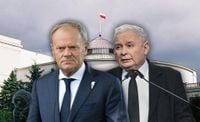The latest poll by United Surveys for Wirtualna Polska reveals a significant shift in Poland's political landscape, with the Koalicja Obywatelska (KO) regaining the lead in voter support. According to the survey conducted on April 28-29, 2025, KO has garnered 30.4% of the vote, marking an increase of 1.8 percentage points since mid-April 2025. This resurgence places them ahead of the ruling Prawo i Sprawiedliwość (PiS), which has seen its support decline to 27.3%, a drop of 2.3 percentage points.
Meanwhile, the Konfederacja party, known for its right-wing stance, has secured 14.4% of the vote, reflecting a modest increase of 0.5 percentage points. The Trzecia Droga party, which includes members from the Polish People's Party (PSL) and Poland 2050, has also seen a rise in support, now at 8.8%, an increase of 0.7 percentage points. In contrast, the Lewica party recorded a slight decrease, with 6.8% support, down 1.1 percentage points from the previous survey.
Partia Razem, on the other hand, remains below the election threshold with a support level of 3.9%, despite a 0.4 percentage point increase. The survey indicates that 1% of respondents are inclined to vote for other parties, while 7.4% remain undecided.
The current coalition, led by KO, could potentially secure 233 seats in the Sejm, which would provide them with a majority necessary to form a government. This projection underscores the shifting dynamics ahead of the upcoming parliamentary elections, as the political landscape in Poland continues to evolve.
The survey was conducted using both telephone interviews (CATI) and online methods (CAWI), with a representative sample of 1,000 participants, ensuring a broad cross-section of public opinion. The results reflect a pivotal moment for Polish politics, with KO reclaiming its position as the frontrunner.
As the political race heats up, analysts are closely monitoring the implications of these shifts. The decline in support for PiS, traditionally seen as a dominant force in Polish politics, raises questions about the party's strategy moving forward. Jarosław Kaczyński, the leader of PiS, will need to address these challenges head-on to regain voter confidence.
In the meantime, Donald Tusk, the leader of KO, is capitalizing on this momentum, emphasizing the need for a change in governance that resonates with the electorate's concerns. "We are committed to addressing the issues that matter most to Polish citizens," Tusk stated, highlighting the party's focus on economic stability and social justice.
The rise of Konfederacja also adds an interesting dimension to the electoral landscape. With its increasing support, the party is positioning itself as a viable alternative for voters seeking a more right-leaning option. Sławomir Mentzen, one of the party's leaders, has been vocal about their intentions to challenge the status quo, advocating for policies that resonate with their base.
Trzecia Droga's upward trajectory suggests that there is room for centrist and moderate voices in the current political discourse. Leaders like Szymon Hołownia and Władysław Kosiniak-Kamysz are working to unite various factions within the electorate, aiming to appeal to those disillusioned with the traditional parties.
As the election date approaches, the undecided voters will play a crucial role in determining the outcome. With 7.4% of respondents still unsure of their choice, both KO and PiS will need to intensify their outreach efforts to sway this demographic.
In conclusion, the latest polling data paints a complex picture of Poland's political future, with the potential for significant changes in the upcoming elections. As parties recalibrate their strategies, the focus will remain on addressing voter concerns and presenting compelling visions for the country's direction.






